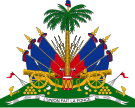
Fanmi Lavalas, is a social-democratic political party in Haiti. Its leader is former Haitian President Jean-Bertrand Aristide. It has been a powerful force in Haitian politics since 1991. Fanmi Lavalas governments advocate a policy of "growth with equity" based on Caribbean and Western European social democratic principles. Fanmi Lavalas governments have emphasised investment in education and health care as their priorities and have refused International Monetary Fund austerity measures.

Elections in Haiti gives information on election and election results in Haiti.

General elections were held in Haiti in 1995. The presidential election, held on 17 December, resulted in a victory for René Préval of Fanmi Lavalas. The parliamentary elections, held on 25 June, 13 August and 17 September, were also won by Lavalas. Voter turnout was just 31.09% for the parliamentary elections and 27.8% for the presidential elections.

General elections were held in Haiti between 16 December 1990 and 20 January 1991. The presidential election, held on 16 December, resulted in a victory for Jean-Bertrand Aristide of the National Front for Change and Democracy (FCND), whilst the FCND also won the parliamentary elections in which voter turnout was 50.8%. It was widely reckoned as the first honest election held in Haiti since the country gained independence in 1804.

Parliamentary elections in 2000 were held in Haiti in two separate sets of elections, on May 21, 2000 and July 9, 2000, for all 83 seats in the Chamber of Deputies and nineteen seats in the Senate, and later that year, at the same time as November 26, 2000 presidential election for eight Senate seats. The legislative elections and presidential elections in the fall ran largely smoothly, however the first and second rounds of the spring elections generated the most controversy.

The Chamber of Deputies is the lower house of Haiti's bicameral legislature, the National Assembly. The upper house of the National Assembly is the Senate of Haiti. The Chamber has 119 members who are elected by popular vote to four-year terms. There are no term limits for Deputies; they may be re-elected indefinitely.

The Senate is the upper house of Haiti's bicameral legislature, the National Assembly. The lower house of the National Assembly is the Chamber of Deputies. The Senate consists of thirty seats, with three members from each of the ten administrative departments. Prior to the creation of the department of Nippes in 2003, there were twenty-seven seats. Senators are elected by popular vote to six-year terms, with one-third elected every two years. There are no term limits for Senators; they may be re-elected indefinitely.

The Provisional Electoral Council is the electoral commission of Haiti. The body is the sole agency responsible for presidential elections and parliamentary elections. As of 2015, CEP remains Haiti's main and only legal election agency.

Presidential elections were held in Haiti on 26 November 2000. The opposition parties, organised into the recently created Convergence Démocratique, boycotted the election after disputing the results of the parliamentary elections. The result was a landslide victory for Jean-Bertrand Aristide, who received 91.7% of the vote with a turnout of around 50%.

Parliamentary elections were held in Haiti on 30 April 1961. They followed the dissolution of Parliament by President François Duvalier and the abolition of the Senate, making the Chamber of Deputies a unicameral body. Duvalier's National Unity Party won all 67 seats in the elections, which were later re-interpreted as presidential elections in order to give Duvalier a six-year presidential term and avoid the need for scheduled presidential election in 1963.

Parliamentary elections were held in Haiti on 12 February 1984. All but one of the candidates were members of the National Unity Party (PUN) of President Jean-Claude Duvalier. The PUN subsequently won all 59 seats.

Parliamentary elections were held in Haiti on 11 February 1979. Around 300 candidates contested the election, almost all of whom were supporters of President Jean-Claude Duvalier. All but one of the seats in the Chamber of Deputies were won by candidates of the National Unity Party, whilst the other was won by an independent in Cap-Haïtien.

Parliamentary elections were held in Haiti on 6 April 1997 for one third of the seats in the Senate and two in the Chamber of Deputies. A total of 45 candidates from 15 parties contested the Senate elections.

Parliamentary elections were held in Haiti on 9 August 2015, with a second round planned initially on 25 October. Two-thirds of the Senate and all members of the Chamber of Deputies were up for election.

The Haitian Tèt Kale Party is a Haitian political party. Tèt Kale means "Bald Headed" in Haitian Creole.

Senate elections were held in Haiti with a first round on 20 November 2016, and a second on 29 January 2017. The first round were held simultaneously with the presidential elections and the second round of the parliamentary elections that still had a run-off pending in some constituencies since 2015.

Parliamentary elections were held in Haiti on 12 May 1946. They followed the overthrow of President Élie Lescot's government by Paul Magloire on 11 January.

Parliamentary elections were held in Haiti on 9 January 1955. They were rigged by President Paul Magloire to ensure that Daniel Fignolé would not be elected to the Chamber of Deputies.

Parliamentary elections were held in Haiti on 14 October 1930. The elections were authorized by the United States, which wished to pull out of Haiti after a lengthy occupation, and resulted in a majority for nationalist forces. The newly elected National Assembly elected Sténio Vincent as president on 18 November.







